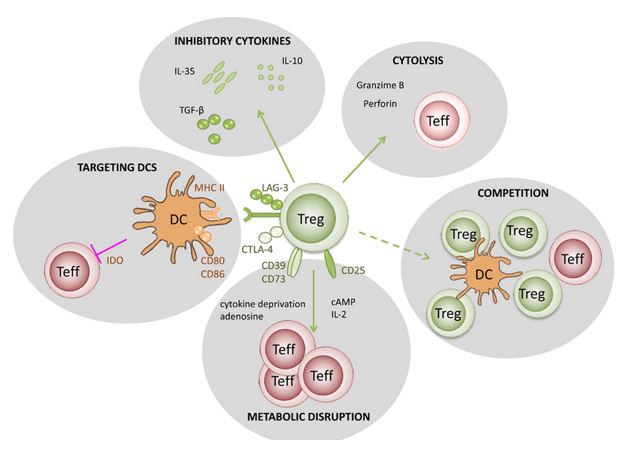Creative Biolabs offers the unparalleled mass sequencing service to analyze the T cell receptors (TCR) repertoires. With our advanced Magic™ TCR repertoire analysis platform, our scientists are skillful in identifying regulatory T cells (Tregs) in patients.
Tregs are a subpopulation of T cells which modulate the immune system and maintain tolerance to self-antigens. Tregs are immunosuppressive and generally downregulate induction and proliferation of effector T cells. There are many forms of Tregs, such as CD4, CD25, and FOXP3 (CD4+CD25+ regulatory T cells). Mouse models have suggested that modulation of Tregs can treat autoimmune disease and cancer, and can facilitate organ transplantation. Tregs seem to be upregulated in individuals with cancer, as being recruited to the site of many tumors. Studies in both humans and animal models have implicated that high numbers of Tregs in the tumor microenvironment indicate a poor prognosis. In addition, Tregs are thought to suppress tumor immunity, thus hinder the body's innate ability to control the growth of cancerous cells. Putative mechanisms used by Tregs are shown in the picture below (Fig. 1). The immunosuppressive characteristic of Tregs prevents the development of autoimmune disease, so it is not desirable during immune responses to infectious microorganisms. Some pathogens may evolve to operate Tregs to immunosuppress the host and so potentiate their survival. For example, Tregs' activity has been reported to increase in several infections, such as HIV, tuberculosis, leishmaniasis, and malaria. Depletion of Tregs in animal models has shown an increased efficacy of immunotherapy treatments, and therefore, many immunotherapy treatments are now incorporating Treg depletion.
 Fig.1 Putative mechanisms used by regulatory T cells (Caridade et al. 2013).
Fig.1 Putative mechanisms used by regulatory T cells (Caridade et al. 2013).
Above all, the identification of Tregs is an important key to immunotherapy treatments. Dissecting the role of Tregs in disease pathogenesis is crucial to understand the immunological mechanisms for therapy and the development of precision medicine. Previously, Tregs are identified by antigen markers, such as FoxP3, CD25, CD127, CD45RA. But There are a number of problems with these methods, such as arising unviable Tregs or low recovery of Tregs. Creative Biolabs has uncovered an easily accessible tool to identify Tregs in patients by using TCR repertoire sequencing on our Magic™ platform. The CDR3 domains of TCR β are sequenced, and sequences from our Magic™ platform are analyzed meticulously. Each sample is interpreted as a distribution of T cell genomes belonging to different TCRs. The similarity between samples is determined by the number and frequencies of shared clonotypes. The similarity between samples was calculated either using the Chao-modified Jaccard index. This tool could be an innovative antigen-agnostic approach to shed light on pathogenic mechanisms of autoimmune disease and unresponsiveness to therapy.
Key advantages including but not limited to:
Scientists of Creative Biolabs have performed over hundreds of TCR repertoire sequencing projects and accumulated sufficient experience in identifying regulatory T cells. We are pleased to offer the best service with the most accurate results for our global customers.
For more detailed information, please feel free to contact us or directly send us an inquiry.
References
All listed services and products are For Research Use Only. Do Not use in any diagnostic or therapeutic applications.